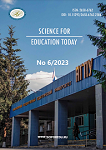Особенности познавательной деятельности студентов с нарушением слуха в цифровой среде: выявление трудностей и успешных стратегий метакогнитивного и когнитивного характера
Learning experiences of deaf and hard-of-hearing students in digital media: Challenges and the use of cognitive and metacognitive strategies
Author(s): Yulia V. Krasavina, Ekaterina Petrovna Ponomarenko, Andrey A. Gareyev, Anastasia Andreevna ShishkinaSubject(s): Media studies, School education, Educational Psychology, Sociology of Education, Distance learning / e-learning, Pedagogy
Published by: Новосибирский государственный педагогический университет
Keywords: Learning; E-learning; Digital media; Deaf and Hard-of-hearing students; Cognitive strategies; Metacognitive strategies;
Summary/Abstract: Introduction. The paper deals with the problem of developing cognitive competence of deaf and hard-of-hearing students when learning in the digital media. It is aimed at identifying and generalizing difficulties and successful strategies of metacognitive and cognitive nature in deaf and hard of hearing students of a technical university when performing assignments in the digital media. Materials and Methods. For the preliminary selection of participants, V. S. Yurkevich's "Intensity of cognitive interests" inventory and N. S. Kopeina’s learning styles questionnaire were used. Qualitative research methods applied included verbal records and observation; data analysis was carried out using the grounded theory method. The study involved 5 deaf and hard-of-hearing students, selected on the basis of survey results and academic performance. During individual sessions, participants were required to complete assignments developed on the basis of a scenario requiring the use of cognitive and metacognitive strategies. Results. The study identified main difficulties and cognitive and metacognitive strategies in carrying out learning activities in the digital media used by deaf and hard-of-hearing students, who were characterized as high achievers. They were generalized and classified into the following categories: understanding the task; predicting the result; planning; information search; online reading; information selection; "survival" strategies; personal learning network. Conclusions. The paper presents specific features of cognitive competence of deaf and hard-ofhearing students in the digital media: limited range of cognitive and metacognitive strategies, and challenges associated with insufficiently developed reading skills at the stage of understanding the task, selecting and correcting keywords, abstract analysis, site selection and information selection. The analysis of the study results led to the conclusion that deaf and hard-of-hearing students should be educated about cognitive and metacognitive e-learning strategies. The identified difficulties when working in the digital media have shown that digital content developers should consider the problem of generating incorrect subtitles, as well as recommendations for the designing digital texts using highlighting, hyperelements and plenty of illustrations.
Journal: Science for Education Today
- Issue Year: 13/2023
- Issue No: 6
- Page Range: 60-81
- Page Count: 22
- Language: Russian

